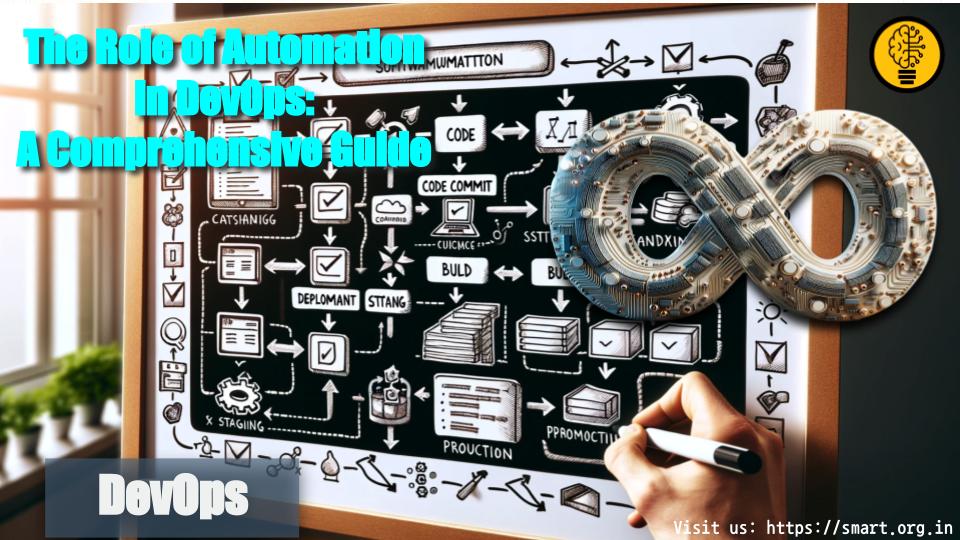In the dynamic world of software development, DevOps has emerged as a game-changing philosophy, blending development (Dev) with operations (Ops) to enhance agility and efficiency. Central to this transformative approach is automation. This guide delves into the pivotal role of Automation in DevOps, illustrating how it propels organizations towards achieving their software delivery goals with unprecedented speed and reliability.
Unveiling the Essence of Automation in DevOps
- Foundation of DevOps
- Automation is the backbone of DevOps, streamlining processes to bridge the gap between software development and IT operations.
- Accelerating Processes
- From code integration to deployment, automation accelerates repetitive tasks, enabling teams to focus on innovation and problem-solving.
Key Areas of Automation in DevOps
- Continuous Integration (CI)
- Automates the merging and testing of code, ensuring that new changes integrate well with the existing codebase, thereby enhancing code quality and reducing integration issues.
- Continuous Deployment (CD)
- Automates the deployment process, allowing for seamless and frequent releases to production with minimal human intervention.
- Infrastructure as Code (IaC)
- Manages and provisions infrastructure through code, ensuring consistency, and reducing manual configuration errors.
- Monitoring and Logging
- Automates the collection, analysis, and visualization of logs and metrics, facilitating proactive issue detection and resolution.
Benefits of Automation in DevOps
- Enhanced Efficiency and Productivity
- Automation eliminates manual tasks, freeing up teams to focus on more strategic work, thereby boosting productivity.
- Improved Consistency and Reliability
- Automated processes are repeatable and less prone to human error, leading to more consistent and reliable outcomes.
- Faster Time to Market
- With automation, organizations can push updates and new features faster, keeping pace with market demands and customer expectations.
- Scalability
- Automation makes it easier to scale operations up or down as needed, supporting business growth and dynamic market conditions.
Implementing Automation in DevOps
- Assess and Plan
- Evaluate current processes to identify automation opportunities and prioritize them based on potential impact and feasibility.
- Select the Right Tools
- Choose tools that align with your technology stack and DevOps goals. Popular options include Jenkins for CI/CD, Terraform for IaC, and Prometheus for monitoring.
- Develop Skills and Culture
- Foster a culture that embraces automation and continuous learning. Provide training and resources to upskill team members.
- Iterative Implementation
- Start small with automation, gather feedback, and iterate. This approach reduces risk and allows for continuous improvement.
Challenges and Considerations
- Integration with Existing Systems
- Ensuring new automation tools integrate seamlessly with existing systems and workflows is crucial to avoid disruptions.
- Security and Compliance
- Implement robust security practices in automated workflows to protect sensitive data and comply with regulatory requirements.
- Change Management
- Managing the transition to automated processes requires clear communication, stakeholder engagement, and change management strategies.
Automation is not just a component of DevOps—it’s the catalyst that drives its success. By automating repetitive and time-consuming tasks, organizations can significantly enhance efficiency, reliability, and speed. However, the journey to automation requires careful planning, the right tools, and a commitment to continuous improvement. As businesses continue to navigate the complexities of digital transformation, the role of automation in DevOps will undoubtedly remain indispensable, paving the way for innovation and excellence in software delivery.
Smart Group India is at the forefront of revolutionizing the way startups and corporates embrace DevOps practices. With a seasoned team of experts, they offer bespoke consultancy services designed to seamlessly integrate DevOps into the core of business operations. Their approach is holistic, focusing not only on the technical aspects but also on fostering a culture of collaboration, efficiency, and continuous improvement. By tailoring strategies that align with each organization’s unique needs and goals, Smart Group India ensures that their clients are well-equipped to navigate the complexities of modern software development, ultimately driving growth and innovation in today’s fast-paced digital landscape.


In conclusion, we at Smart Group hope this article has provided you with valuable insights and actionable strategies. Smart Group India Incubation provides a nurturing environment for startups, offering comprehensive support and resources to foster growth and innovation. With access to expert mentorship, state-of-the-art infrastructure, and networking opportunities, startups can thrive in their journey from ideation to market launch. Explore our services in DevOps consultancy, IoT solutions, and cybersecurity to leverage cutting-edge technology for your business success. Join us to embark on a transformative journey towards entrepreneurial excellence. For further information and a deeper dive into this topic, we encourage you to explore the following resources. These links offer a wealth of knowledge and expert opinions that can enhance your understanding and assist you in applying these concepts effectively.
Startup Policies Govt. Of India
Startup News Sites
Publications
Research Papers